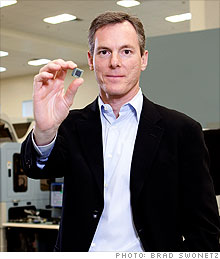What's next for Qualcomm?
The company rakes in cash every time someone else builds a wireless device. No wonder CEO Paul Jacobs wants to put a phone in every conceivable gadget.
 |
| Paul Jacobs, chief executive of Qualcomm |
(Fortune Magazine) -- Paul Jacobs could be the Clark Kent of the tech sector. Tall, clean-cut, and a tad bookish (he has a Ph.D. in engineering), he's the epitome of the mild-mannered CEO -- most of the time.
But get him started on the future of wireless gadgetry, and he unleashes his inner action hero. "That's the guts of a phone," he declares, brandishing a Chiclet-size wireless chipset. But, he adds, that technology can also find a home in lifesaving medical devices or thermostats that will regulate energy use.
Jacobs is on a mission to put a phone (in the form of that thumbnail-size microprocessing unit) in every gadget he can. Qualcomm (QCOM, Fortune 500), for example, has developed a videogame console for emerging markets called Zeebo that launched this month in Brazil. Instead of buying cartridges or DVDs, players download games over a cellular network.
With its Atari-era graphics, Zeebo will never pose a serious threat to Microsoft's Xbox, say, but Jacobs claims that he couldn't care less. He insists he isn't trying to build the world's best game system; he's creating a new market for Qualcomm's wireless chips and intellectual property.
It's a formula that has worked for Qualcomm before. Nearly 15 years ago Jacobs's father, Irwin, pioneered CDMA, or code division multiple access, the technology that now is a leading standard for the modern cellphone network. In the early days, though, there weren't a lot of phones running on the technology, so Qualcomm decided to build handsets itself. The business, which Paul ran, lost money. (Qualcomm eventually sold it to a Japanese handset manufacturer.) But the strategy succeeded because it helped create a market for CDMA. "Our technology doesn't necessarily need to win in order for Qualcomm to win," says Jacobs. "If it just causes the whole industry to move, we actually win."
That's partly because Qualcomm makes big money - about two-thirds of its 2008 profit of $1.7 billion -- from royalties that device makers pay it for use of those CDMA-related patents. Now, though, wireless-phone companies are starting to move to a new broadband wireless standard, Long-Term Evolution, or LTE, that relies on fewer Qualcomm patents and will mean smaller payments to Qualcomm. To make up for this declining royalty stream, Jacobs essentially must boost the volume of payers, encouraging device makers to put Qualcomm's intellectual property in new gadgets such as thermostats and, yes, game consoles.
But rivals and partners suggest Jacobs has far greater ambitions for Qualcomm than simply to sell chips and collect royalties on his dad's pioneering patents. He seems to be seeking to build a wireless technology company, churning out new products and platforms capable of generating billions of dollars in revenue for Qualcomm. So far? No home runs. Jacobs in 2004 invested some $800 million in Media FLO, a business that aims to provide live television to cellphones. The service requires a special chip not found in most phones, so Qualcomm is teaming up with AudioVox (VOXX) to put live TV in the back seats of cars. Meanwhile a competing standard for live TV on phones is gaining traction overseas.
Jacobs offers his standard laid-back rap about how Qualcomm would be perfectly happy to see another mobile TV standard succeed if that meant more handset sales. On the other hand, he tells Fortune he thinks Media FLO could be a disruptive business for Qualcomm. Ditto a wireless-applications storefront (think Apple's App Store) and a new low-power display technology called Mirasol that promises LCD quality for a cellphone or an e-reader. But Macquarie Securities analyst Philip Cusick doubts that any of them will come close to producing the profits of Qualcomm's key patents. The success or failure of these big bets may help determine whether Jacobs stays as merely a Clark Kent -- or emerges as a superhero CEO. ![]()
-
 The retail giant tops the Fortune 500 for the second year in a row. Who else made the list? More
The retail giant tops the Fortune 500 for the second year in a row. Who else made the list? More -
 This group of companies is all about social networking to connect with their customers. More
This group of companies is all about social networking to connect with their customers. More -
 The fight over the cholesterol medication is keeping a generic version from hitting the market. More
The fight over the cholesterol medication is keeping a generic version from hitting the market. More -
 Bin Laden may be dead, but the terrorist group he led doesn't need his money. More
Bin Laden may be dead, but the terrorist group he led doesn't need his money. More -
 U.S. real estate might be a mess, but in other parts of the world, home prices are jumping. More
U.S. real estate might be a mess, but in other parts of the world, home prices are jumping. More -
 Libya's output is a fraction of global production, but it's crucial to the nation's economy. More
Libya's output is a fraction of global production, but it's crucial to the nation's economy. More -
 Once rates start to rise, things could get ugly fast for our neighbors to the north. More
Once rates start to rise, things could get ugly fast for our neighbors to the north. More







